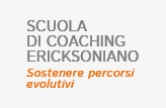ERICKSONIAN COACHING TRAINING
supporting the growing process
MEMBER OF

Who is it for: this course is open to those who have already attended our Institue first two levels of HYPNOSIS
MODUL 1
RECEIVING THE CLIENTS QUESTION
The first session
- Developing analysis skills about the context and its existing cultures and relations
- Elaborating and defining the goal with the client
- Focus on ethical code and professional norms
The Ericksonian philosophy is the background that frames the coaching training. The first step of the coaching process is to clearly define the goals that the client wants to achieve. The goal of the coaching process is co-constructed with the client as it is not a top down process leaded by the coach. However, in order to propose sustainable and ecological interventions, the coach has to develop sound analytic skills in order to be able to analyze the client's unique features, his/her contexts of life and work and the relational dynamics in them. Timing is a crucial issue of any intervention. The coach has find the appropriate timing to focus on a critical situation and face it, without pushing or slowing the change process. For this reason the coach knows how to utilize the client's story in order to create self awareness and confidence in the personal value (this counts also if the client is an organization). The client's potential is acknowledge and fostered and it constitutes the basis for achieving the goal. The coaching process toward the goal is cast in small steps. According to our model, in fact, pushing changes might block the process and provoke resistances. Any intervention has to be consistent with the client's personal value and identity (and this counts also for organizations). The coach reflect with the client about how the relation has been developed, maintaing a constant learning attitude. Particular attention is paid to the end of the process. In this final part, in fact, the coach has to work on the consolidation of results. A balanced mixture of change and stability has to be utilized.
AC is a no-profit organization committed to promote good practice along with the development and improvement of the standard required to work as a coaching professionals required standard. AC has an international character, with members in 40 different countries.
“Our purpose is to inspire and champion coaching excellence, to advance the coaching profession, and make a sustainable difference to individuals, organizations, and in turn, society.”
Who is it for: this course is open to those who have already attended our Institue first two levels of HYPNOSIS
MODUL 1
RECEIVING THE CLIENTS QUESTION
The first session
- Developing analysis skills about the context and its existing cultures and relations
- Elaborating and defining the goal with the client
- Focus on ethical code and professional norms
MODUL 2
FOLLOW THE QUESTION ALONG THE PROCESSING
Small steps toward the aim
- Learn how to utilize the client's story to create self awareness and recognize valuer
- Reflecting on the appropriate timing for zooming on a critical situation and facing it
- Elaborating a hypothesis of intervention
MODUL 3
A FURTHER FOCUS ON THE RELATION BETWEEN THE COACH AND THE CLIENT
Working with
- Reflecting on how the relation has began and developed
- Continuing learning attitude as a tool for working
- The Ericksonian rapport
MODUL 4
TRAINING THE TECHNIQUES
Competencies in service of the clients
- Utilization of client's relational resources
- Creating conditions to make the client's potential emerge
- Using this potential to achieve the goal
MODUL 5
CONSOLIDATE THE RESULTS
Stabilize what has been accomplished
- Recognizing and utilizing stability and change
- Prefiguring what's next
- Ending and evaluating the intervention
The Ericksonian philosophy is the background that frames the coaching training. The first step of the coaching process is to clearly define the goals that the client wants to achieve. The goal of the coaching process is co-constructed with the client as it is not a top down process leaded by the coach. However, in order to propose sustainable and ecological interventions, the coach has to develop sound analytic skills in order to be able to analyze the client's unique features, his/her contexts of life and work and the relational dynamics in them. Timing is a crucial issue of any intervention. The coach has find the appropriate timing to focus on a critical situation and face it, without pushing or slowing the change process. For this reason the coach knows how to utilize the client's story in order to create self awareness and confidence in the personal value (this counts also if the client is an organization). The client's potential is acknowledge and fostered and it constitutes the basis for achieving the goal. The coaching process toward the goal is cast in small steps. According to our model, in fact, pushing changes might block the process and provoke resistances. Any intervention has to be consistent with the client's personal value and identity (and this counts also for organizations). The coach reflect with the client about how the relation has been developed, maintaing a constant learning attitude. Particular attention is paid to the end of the process. In this final part, in fact, the coach has to work on the consolidation of results. A balanced mixture of change and stability has to be utilized.
AC is a no-profit organization committed to promote good practice along with the development and improvement of the standard required to work as a coaching professionals required standard. AC has an international character, with members in 40 different countries.
“Our purpose is to inspire and champion coaching excellence, to advance the coaching profession, and make a sustainable difference to individuals, organizations, and in turn, society.”

